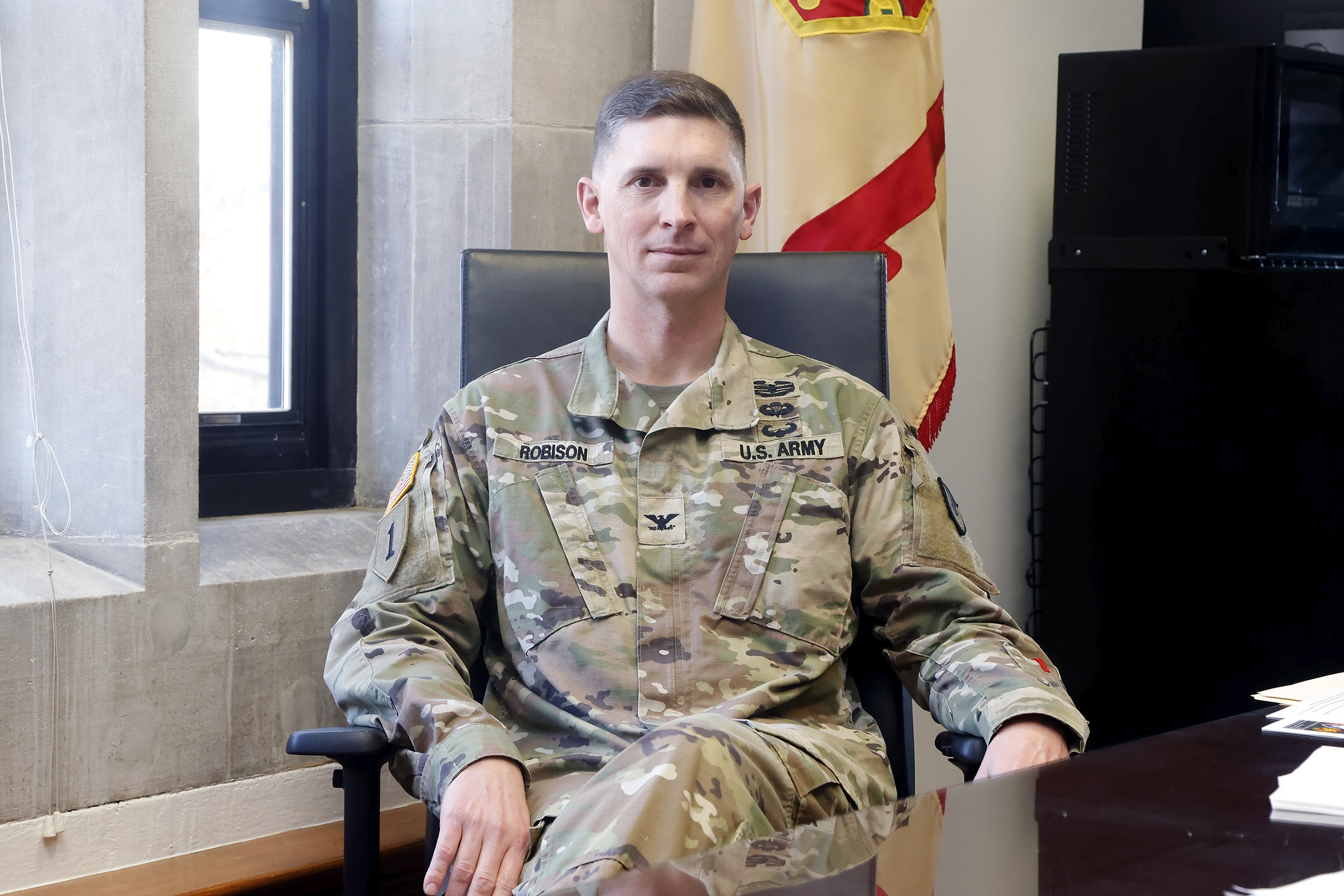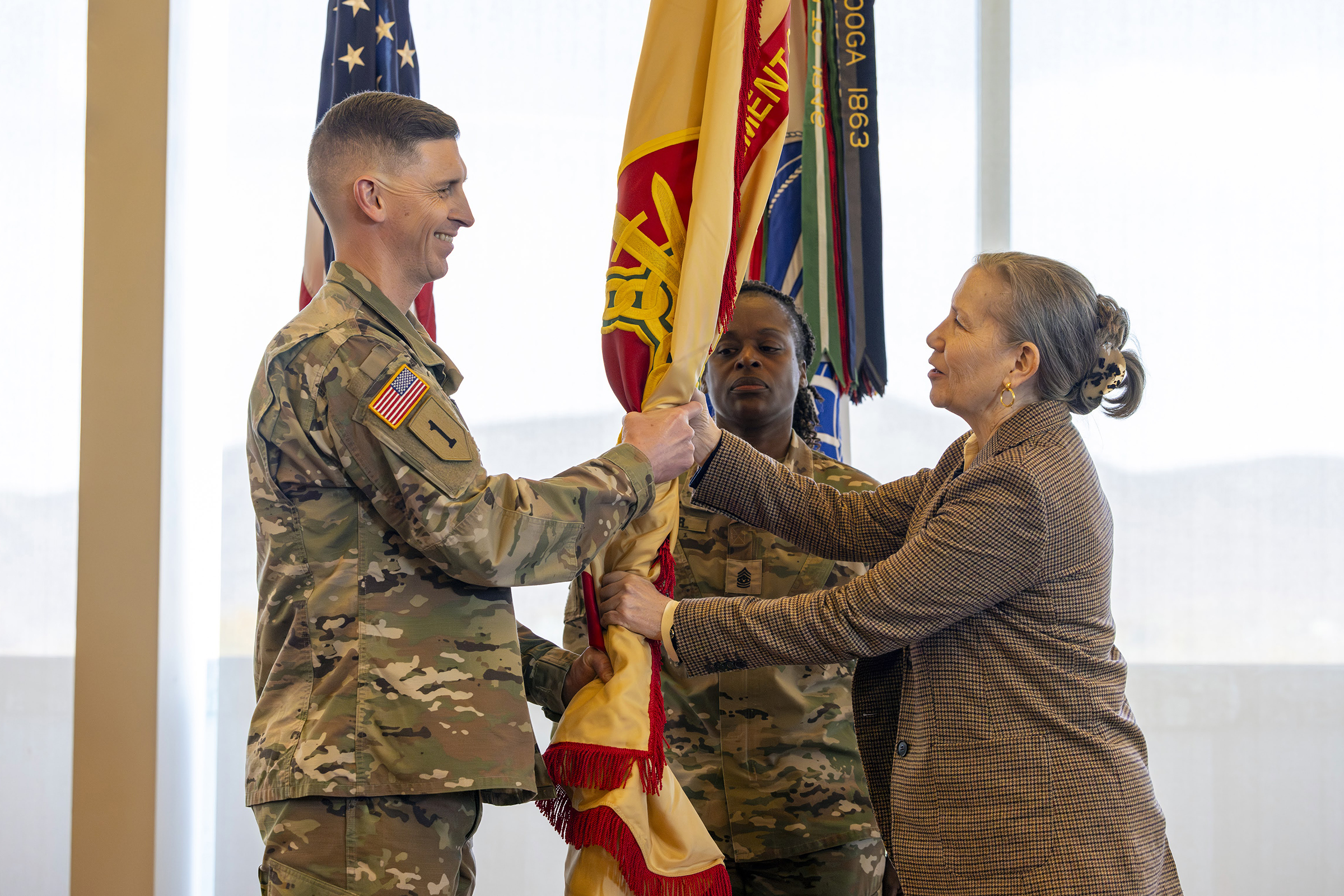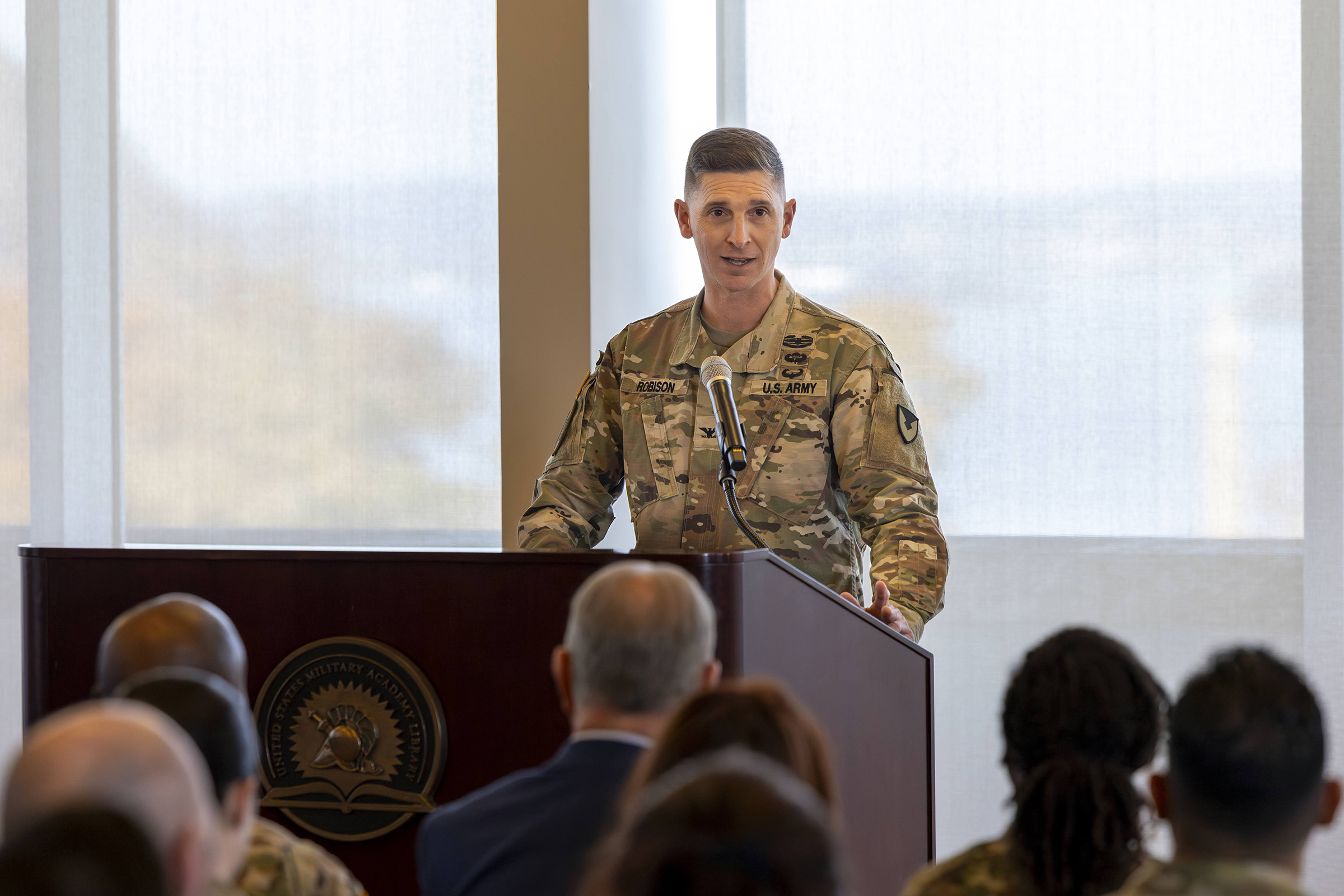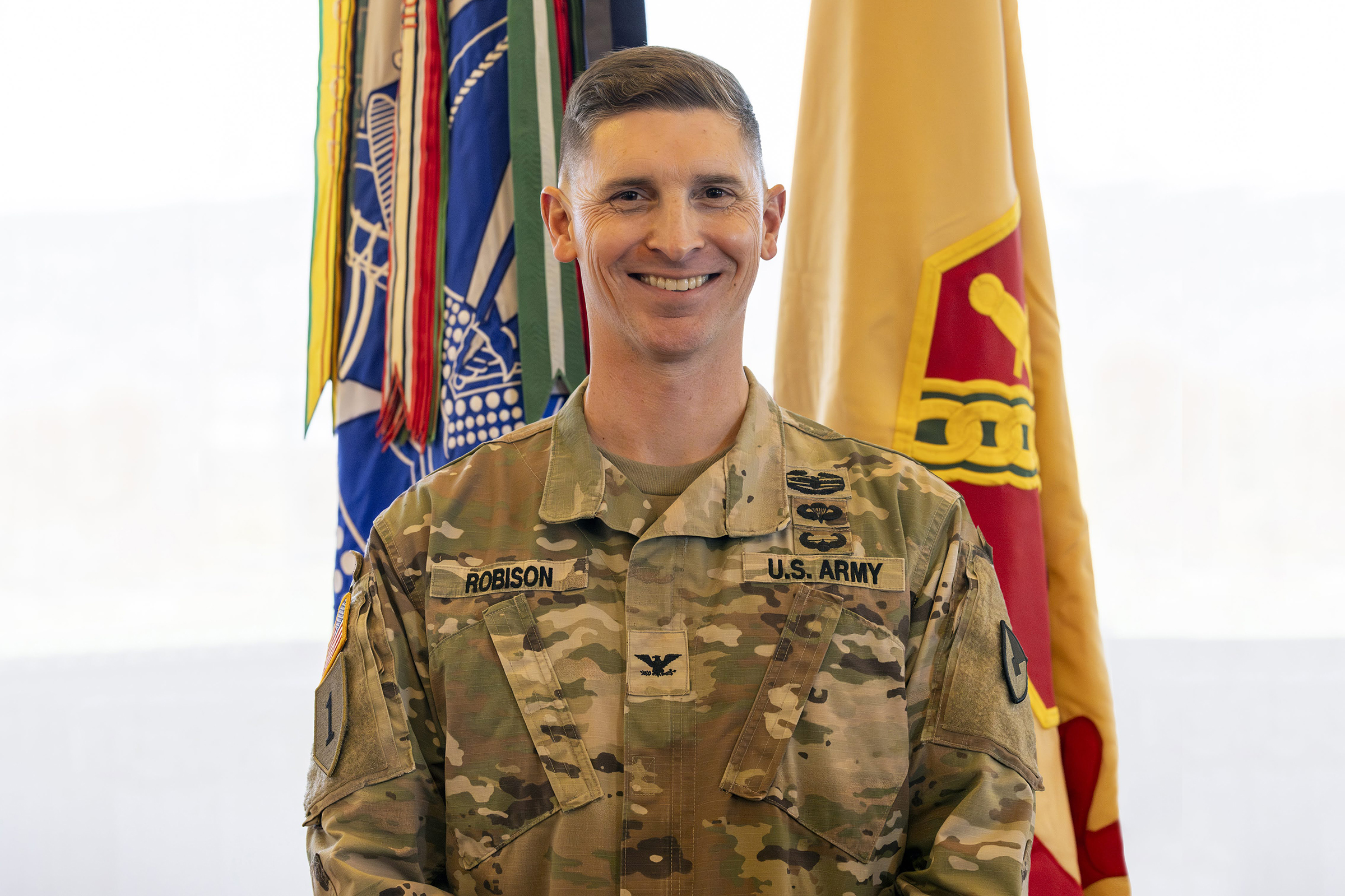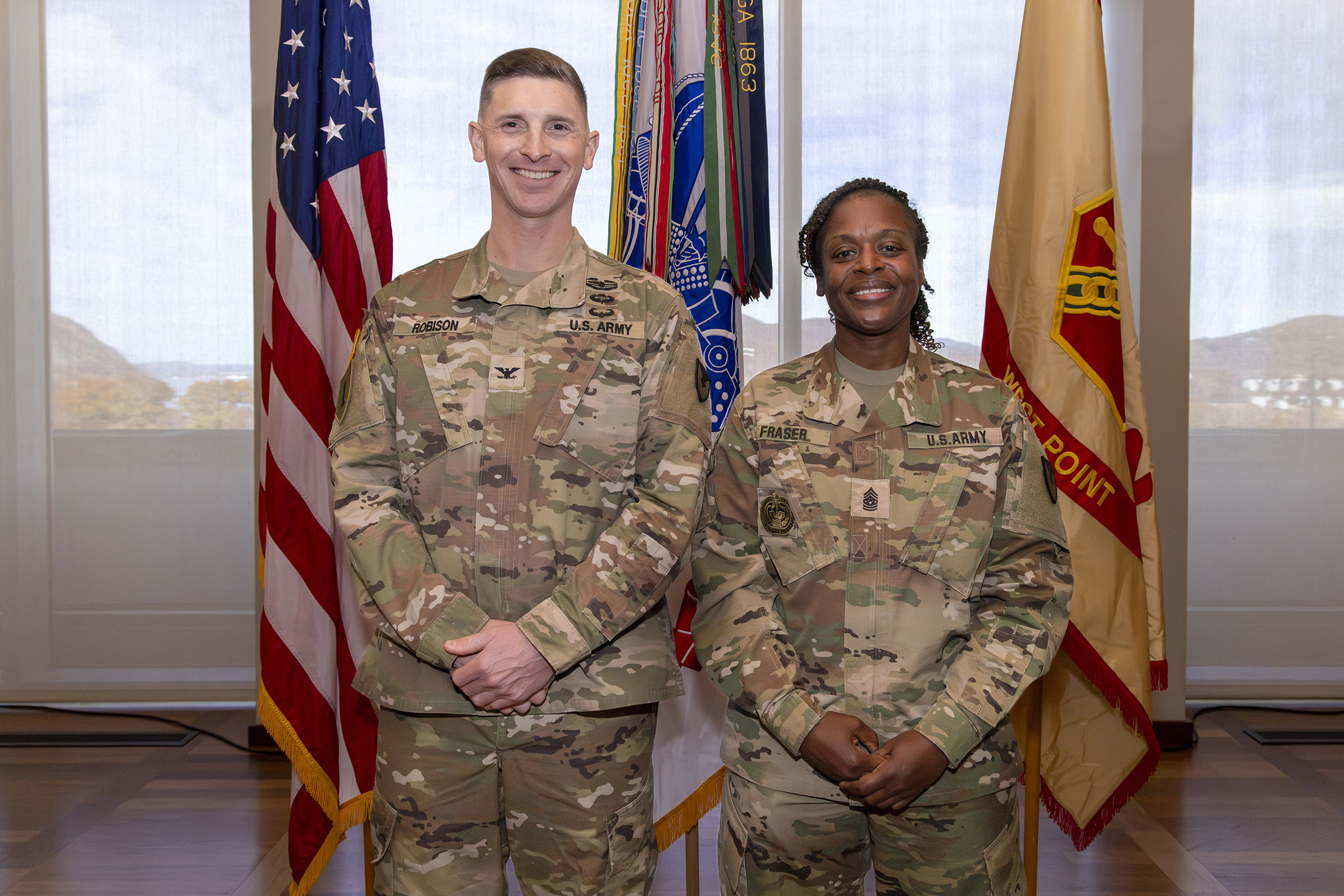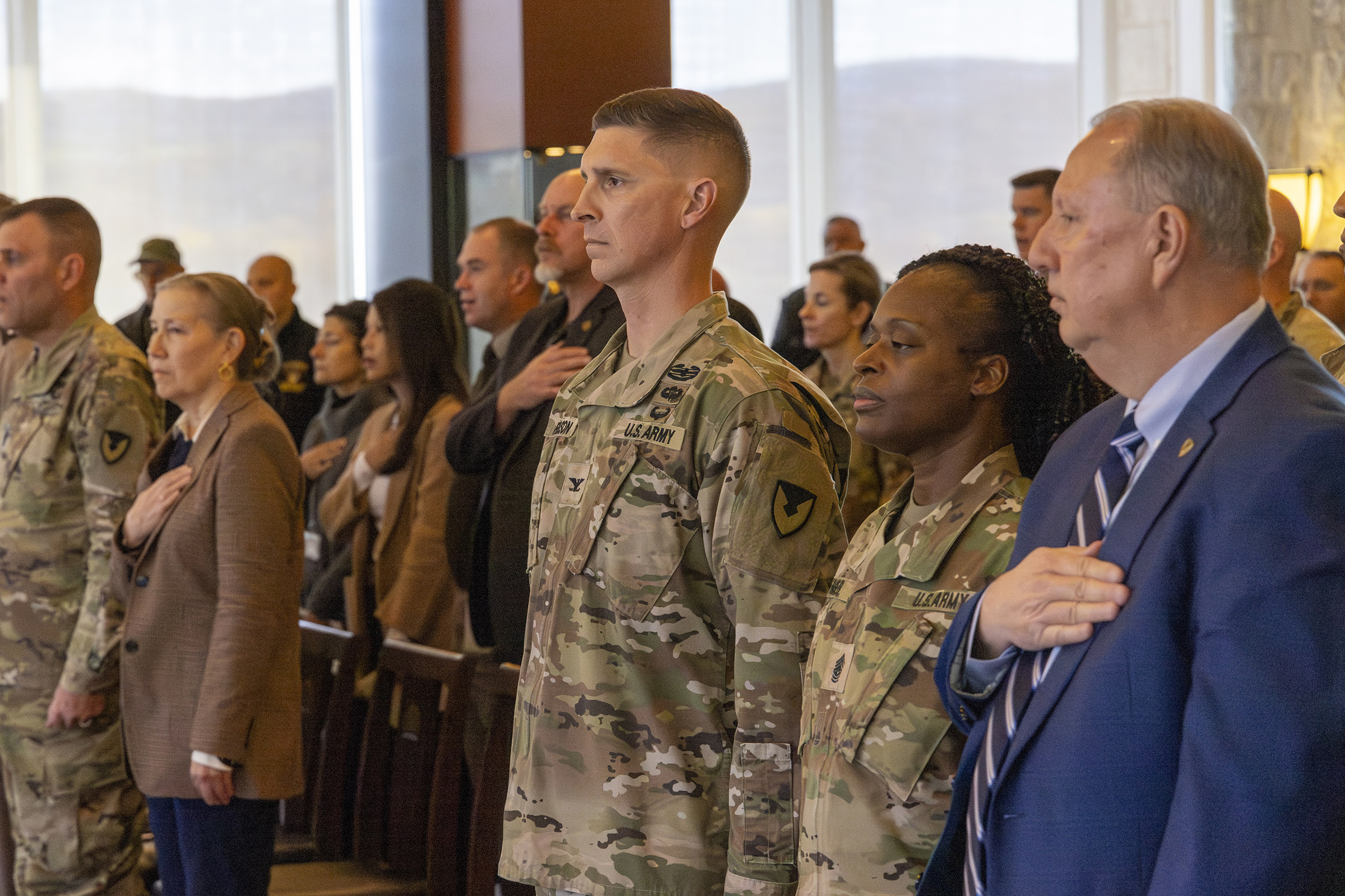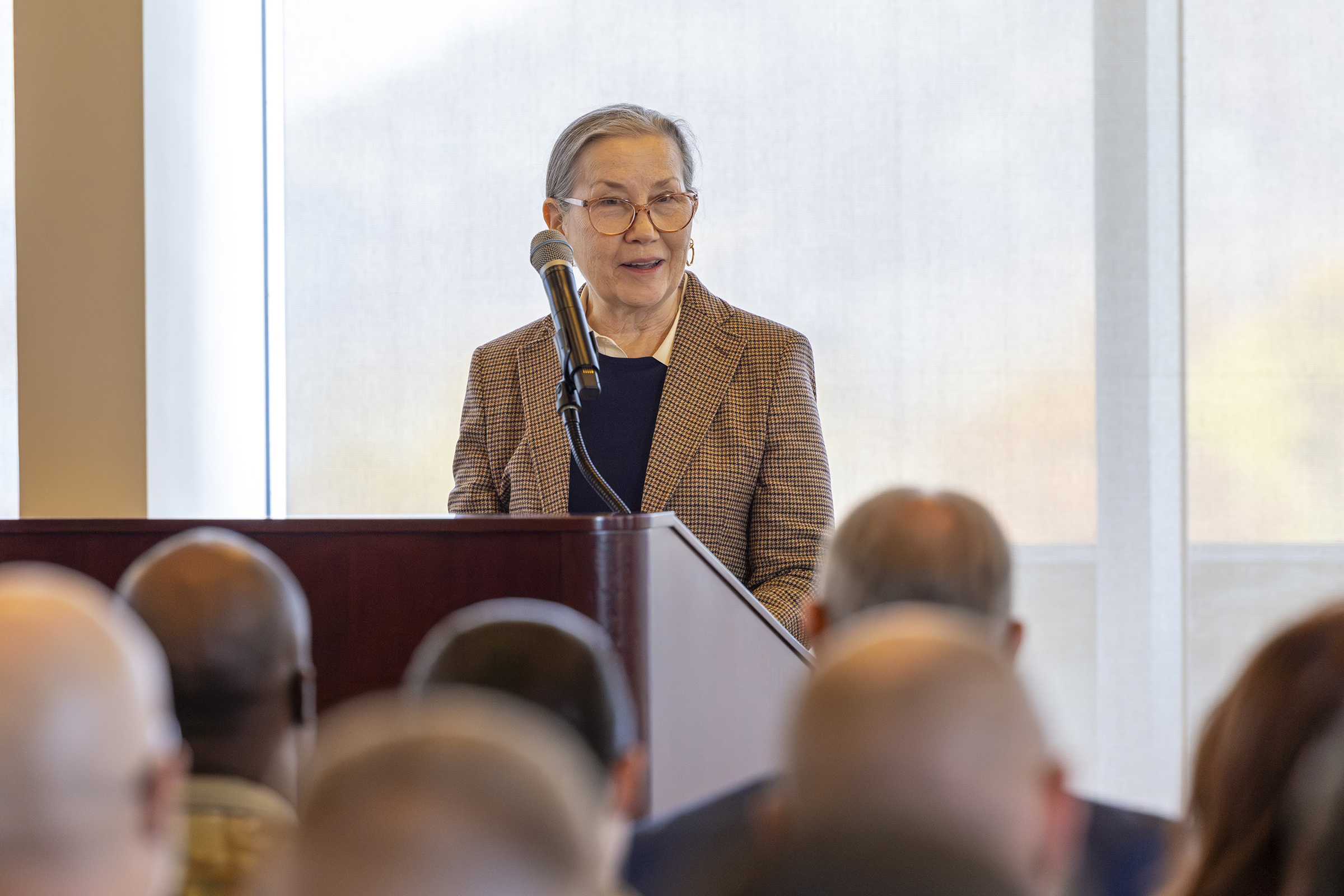For 248 years, a time-honored Army tradition has symbolized the transition of command authority through the passing of the unit colors, or guidon, signifying the transfer of organizational responsibilities to the newly appointed commander.
During the U.S. Army Garrison West Point Assumption of Command ceremony on Nov. 15 in the Haig Room at Jefferson Library, the mantle of leadership was passed to the new Garrison Commander, Col. Travis E. Robison. Previously serving as the Taiwan Branch Chief in the J5 Strategy, Plans and Policy Deputy Directorate for Asia at the Joint Staff in Washington D.C., Robison took charge at West Point.
During the ceremonial transition, Robison assumed the role of garrison commander succeeding the interim commander, Col. Brian Jacobs. In this significant event, Robison received the garrison colors from Kathryn McNeeley, who currently serves as the director (acting) of Installation Management Command (IMCOM) – Training, overseeing 16 active U.S. Army installations and joint bases.
As McNeeley passed the colors to Robison, it marked the pivotal moment he assumed the responsibility of leading the unit. Following this, Robison then passed the colors to Command Sgt. Maj. Michel R. Fraser, the senior enlisted Soldier in the garrison command and the principal advisor to the garrison commander. Robison’s symbolic act demonstrated his confidence in the unit’s noncommissioned officer corps, completing the ceremony with a significant gesture of trust.
McNeeley took to the podium after the colors were passed and addressed the audience, emphasizing the significance of installation management’s success “depends critically on the teamwork and partnerships, and nowhere is this more evident than here at West Point where (Superintendent) Lt. Gen. (Steven) Gilland, as the senior commander, has been a tremendous supporter of the garrison team and its leadership.”
The mission of IMCOM is to integrate and deliver installation support in order to enable quality of life for its people and the readiness of the Army.
“I am honored to partner with (Gilland) and your command team as we gather, as we work together to set high standards for quality of life and prepare for current and future Army readiness at West Point,” McNeeley said.
McNeeley spoke about the recent unprecedented flooding at West Point, and how the community pulled together in an overwhelming time and that Robison is the right leader to continue to move the West Point community forward into the immediate future.
“The recovery efforts and the amazing outcomes validate the dedication of the West Point community,” McNeeley said. “You should be proud. It is evident that we’ve done things better here because we’ve done them together. Fortunately, for IMCOM, the Army and West Point, we’re placing this command in the hands of a very capable leader, Col. Travis Robison, with a track record of excellence and a clear passion for mission, people and families.
“I can’t think of a better leader for the garrison, and he has my full confidence and support,” she added. “Col. Robison brings extensive experience to this position, and his record for excellence in leadership speaks for itself. He has served in a variety of command and staff positions and has served valiantly in operations in both Iraq and Afghanistan.”
Concluding her speech, McNeeley expressed confidence that Robison “will successfully meet the new challenges while inspiring the garrison to new levels of innovation and performance.” Following these remarks, she invited Robison to the podium for a brief message to the community.
Robison, a native of Ambler, Pennsylvania, said a thank you to his fiancé, Caitlin, and two children, Andrew and Sarah, who were not in attendance.
“Though they couldn’t be here today, their unwavering love and support motivated me to be a better leader, focused on creating the type of Army they and all of our families deserve,” Robison said. “Every day they inspire me to be a better person and remind me of what and why we all serve.”
Robison referenced that the ceremony “honors the hard work and dedication of the West Point Garrison team.”
“I’ve quickly learned (the Garrison team) is deeply committed to their mission in supporting the U.S. Military Academy, which is the oldest continuously occupied military post in the United States,” Robison said. “This mission presents distinct challenges, but the standard of excellence and the diligence with which the Garrison team works to care for the community is deeply humbling. I appreciate your past, present and future support as we work together to honor our legacy by providing the best standard of service as possible and being vigorous advocates for the needs of our community. Our Soldiers and families deserve nothing less.”
Robison talked about how amazed he is with the Garrison team, emphasizing their remarkable ability to accomplish tasks without being hindered by resource constraints.
“Whether it’s time or manning or money, I have yet to meet a person here who is not deeply committed to what this place is,” he said. “The community of West Point inspires a passion in people, and I can see it. I’ve been humbled and proud of that. I want to further that and direct it in an even more positive way to let them have the most impact they possibly can because that’s what they want to do – it’s to make West Point the best place it can be.”
Excited to be at West Point and taking on the task at hand as garrison commander
A distinguished military graduate from the University of Colorado’s Army ROTC program, Robison commissioned as a Field Artillery officer in 1999. His extensive service spans far and wide ranging from the 101st Airborne Division at Fort Campbell, Kentucky, and Wonju, South Korea, to the 25th Infantry Division in Hawaii. His diverse career also includes serving as an infantry and armor fire support officer during Operation Joint Guardian in Kosovo, and subsequently supported Operation Iraqi Freedom in 2007 and later deployed to Afghanistan in support of Operation Enduring Freedom.
But throughout his extensive travels, this is the first time Robison has been stationed at the U.S. Military Academy, and he is “exceptionally excited to be here.”
“The history was one of the things that drew me the most,” Robison said. “My priority consideration … was balancing my professional desires and personal requirements. But the opportunity to come to the oldest continuously occupied garrison as a history lover was just a fantastic opportunity, the cultural resources, the legacy of the military academy – it’s just all exciting. Even as a non-West Point grad, to be a part of that legacy is motivating and humbling at the same time.”
The grounds’ historical timeline goes back to the Revolutionary War featuring figures such as George Washington. Graduates like war heroes and presidents, including Ulysses S. Grant and Dwight D. Eisenhower, have imbued the academy with a rich history of remarkable leadership. Robison realizes the formative nature of the academy for cadets who become exceptional leaders and recognizes the significance of playing a small but significant role in supporting the current cadets at West Point.
“As the garrison commander, even though I’m very far removed from the cadets’ daily lives, the ability to provide the environment, experience and take care of faculty and other West Point community members in a way, even if indirectly, can give the cadets perspective of how the Army should be caring for its people because these are the Army’s future leaders,” Robison said. “I want to help shape their perspective of caring for Soldiers and families, and I’m happy to be a part of that. I want to do my best personally and motivate the Garrison team to provide that quality service.”
In his role as garrison commander, Robison’s expectation is continuing the high-quality services West Point enjoys.
“Coming from divisional-level posts like Scofield Barracks, Hawaii, or Fort Campbell, Kentucky, I think the quality of services and the quality of life here is much higher than at many places in the rest of the Army,” Robison said. “I definitely want to contribute to that and continue that high level, but I also want to do a better job of communicating with the community some of the challenges.
“There’s clearly many people who are here who have made West Point home – like the band and the faculty,” he added. “There are people who stay here who went here decades ago and this is their home, and I want to honor that to the best of our ability, even though the Army’s in a resource-constraint environment. I just want to continue to sustain the academy and the garrison to a high standard to continue the legacy of excellence it has.”
Robison knows very well that he is coming into a situation where the post just overcame a catastrophic, record precipitation flood just over four months ago and his focus is on “getting the repairs done as quickly as we can with the resources provided.”
“I don’t think I realized how bad it was and to what extent it caused severe damage,” said Robison, who followed some of what was going on while in Washington D.C., knowing he was coming here. “It’s clear that a large portion of that has already been repaired, cleaned up and budgeted for, but there’s still some longer-term things like you see outside the headquarters building on Washington Road. It’s just being the advocate and articulate the need to higher (headquarters) in order to get the resources we need to bring us up to fully operational capacity and fix all the storm damage that we can.”
Robison said that IMCOM is committed to providing the funds and working toward the goal of completing the storm damage restorations.
“It’s obviously going to be a time-consuming process to get the funds and transfer them to get the work done,” Robison said. “It really is to continue things going in the direction they are headed, which is positive and committed to providing the repairs, but some repairs are going to take time. It’s communicating clearly to the community the timelines, and if there’s a reason for a delay … have that open line of communication so the community understands. But, at echelon, everyone’s committed to getting us back fully operational after such a historic event.”
Robison understands that not everyone is the community is going to be happy with the pace of developments, be it addressing existing problems or storm-related repairs. He emphasizes the importance of honest communication acknowledging that keeping the community isolated or uninformed can lead to problems. According to him, “it can quickly get off kilter and quickly becomes this echo chamber where it’s not healthy for anybody – it’s not good for the community.”
“What I hope to do is to communicate in a way that there’s an understanding community wide, and that’s probably the best that I can do,” Robison said.
His initial focus is going over the West Point Garrison-wide Inspector General report that cataloged the West Point community’s concerns, whether positive or negative, that concentrates on areas such as housing, water issues, community resources, policies, communication, the schools, health care and quality of life.
Robison said as he is diving through the report pages and trying to understand everything going on within the West Point community, and that there’s “a great opportunity” to change any negative perceptions.
“It’s tied to the communication piece as I want to use the Community Leader Forum and every opportunity I can to communicate clearly to the community that one, your voice has been heard. Two, we’re taking action to the best of our ability, and if we can’t take action or if it’s just a false impression or misunderstanding, it’s clarifying that for them,” Robison said. “My concerns and my priorities are going to be what the communities are because that’s ultimately what I’m responsible for is the health and well-being of the West Point community.
“If the community is concerned about housing, water issues or community resources, then that is what the Garrison team is going to take on and do our best to either improve or provide or repair, or whatever the specific need is.”
Recognizing one of the hot button issues is housing at West Point, particularly the imperative to upgrade or repair many of the homes, Robison has delved into the issues head-on. In his first 14 days at West Point, including two as the commander as of Nov. 17, he has had meetings with the Army Housing Office and Balfour Beatty Communities (now rebranded as West Point Family Homes) on at least nine occasions. His last meeting was to discuss WPFH’s 2024 operating budget.
“I am confident that (WPFH), as it relates to West Point Garrison, is actively working to improve the quality of its services and its responsiveness to what the community is asking for,” Robison said. “What I hope to do is continue to relay community concerns, but also help West Point Family homes communicate better … we need to improve the communication and be that honest broker … we’re responsible for providing safe and healthy homes for our community, and (WPFH) is the partner who’s responsible for managing that.
“Garrison is actively involved and deeply passionate about relaying community needs and working with the partner to hold them accountable to meeting those needs,” he added. “I think there’s a middle ground between all concerned and I just want to play that honest broker role.”
Leadership, how serving overseas guided his path and family
Having served in many capacities throughout in his career, to include five overseas tours and two in warzones, Robison believes each assignment has had an accumulative effect on his growth as a leader.
“You want to say your first assignment is the most formative one because that’s what shapes you – and it does,” Robison said. “But then you look at company level command and command in combat, which is the pinnacle of a leader’s trial and mettle and the ability to provide effective leadership under adverse conditions.”
For Robison, the one that was personally impactful was his battalion command in Hawaii with 2nd Battalion, 11th field Artillery, 2nd Brigade, 25th Infantry Division.
“Really it was in part because I came into the unit as the old leader,” said Robison, who commissioned at 24 years old in 1999. “I was one of the oldest ones in battalion, and I was the most experienced officer in the battalion. Yet, my lieutenants, many of whom were West Point grads, were more than half my age – they’re a full generation behind me.
“I had to learn to adapt my leadership style in a way to be relevant to them, and to understand their perspective and take this basic tenet of leadership like purpose, direction, motivation and reshaping and reapplying them in a way that was very different than what it was when I came in,” Robison said. “So, unless I did that, I wasn’t going to reach the next generation of officers. I think the opportunity to change, improve and to connect was, for me, personally rewarding, but also professionally rewarding because there was tangible evidence throughout that was occurring, and it makes me really proud.”
For Robison, despite the changes in times and people, the mission itself hasn’t changed. This is especially poignant for someone who has witnessed the Army’s evolution from pre-9/11 to post-9/11 and understands its profound impact on individual Soldier and mission.
“I have to adapt myself to be relevant, while still imparting those lessons,” Robison said. “It requires a leader to change his or her focus and perspective. You can’t just drive to mission accomplishment at all costs, you have to take a more deliberate approach that’s focused on coaching, teaching, mentoring and developing that next generation of leaders, so when their moment comes, they’re ready to lead.”
Having served in Kosovo, Iraq and Afghanistan, those experiences have helped in cementing his leadership style and ability through those trials and circumstances.
“It improved my confidence to lead because you’ve been tested, you’ve succeeded by whatever metric key you want to apply to it,” Robison said.
Now, he is applying his wealth of experience to a new generation of leaders. With less than a third of today's Army having been battle-tested or wearing a combat patch, the constant turnover in personnel underscores the need for his guidance.
“There’s a quick turnover and I think we, as leaders, lose sight of it,” Robison said. “We’re victims of our own experience where everyone around us at one time was combat tested, every one of us had combat experience. Now, the requirement is to take that combat experience and communicate it to the next generation who haven’t experienced it, but to do it in a way that prepares them for any future challenge – not just relives the challenges we went through … future generations will have different experiences. But still, those trials of combat, those requirements for leadership, those are timeless.”
Robison comes to West Point from D.C. where he worked for “16 months of breakneck speed” involved on the international stage, particularly focused on Taiwan. Engaging non-stop with the National Security Council and the upper echelons of the Department of Defense, he worked intensively on Taiwan-related issues, describing his experience as “eye opening.”
The ongoing international competition between the United States and China has created a tense situation on the world stage, with Taiwan standing at the epicenter of some of that discord.
“Taiwan is considered the pacing scenario. That is the thing leaders expect us to most likely trigger a war with China is Taiwan,” Robison said. “I know from firsthand engagement that the leaders of both countries are deeply concerned about it and are actively engaged in it. We just saw President Biden meet President Xi in San Francisco (last) week. I know a lot of what they talked about, and I’ll just say, I know that both are deeply concerned and are actively working to avoid conflict.
“Right now, you have two leaders at the highest levels who desperately want to avoid conflict, but their hands are tied in a way that makes it hard,’ Robison.
But now Robison gets to settle into his role as garrison commander, and just as important, his role as a father and soon to be husband.
During his speech, he mentioned his family and fiancé, and he said that family has a “tremendous” impact on a Soldier’s well-being. He opened up honestly about being divorced and that he has firsthand experience that you can “take that support for granted.”
“I couldn’t do it without my family,” Robison said. “A lot of times, you don’t know the ways that support manifests. So having experienced that and seen it, it makes it very personal now.”
He talks about his experience of what he had gone through and made it a point to help his Soldiers focus on the important things in life.
“When I was in battalion command, we have these young battery commanders, first sergeants who got to get their job done and they’re doing the Lord’s work with more tasks put upon them then they can reasonably handle,” Robison said. “(They were) trying to put the job ahead of family. To me, it’s like, ‘Hey, man, this doesn’t need to happen today, you don’t need to stay late for this – you need to go home and be with your family.”
He mentioned that if it were up to them, they would remain at the battalion offices until at least 8 p.m. every night. However, he would counsel them that they need to leave by 6 p.m., especially if he intended to leave at 5:30 p.m.
“After 1800, Col. Robison doesn’t need you to be at work, but your wife and kids need you to be home for dinner,” Robison said. “If you’re staying after 1800, I don’t think you’re being a good leader. I think you’re being a bad husband and father. You could see the visceral reaction that they had because they didn’t expect to hear that. But, having gone through a divorce it gave me that perspective to do the right thing.”
For him, it is about connecting with junior leaders and making life lessons relevant to them while communicating that to children, so they grow up to be “good human beings.” For Robison, it is about bringing that family element into the Army and the workplace.
“I want to give these people every opportunity to be good human beings and make the Army an organization that is worth their service and provide the kind of leadership that they deserve and that I would want my kids to get,” Robison said. “It just makes it a much more deeply personal experience. I’ve always had a passion for Soldiers. I’ve always had a love for Soldiers, but having kids deepens that.
“It’s like loving my children helped me love Soldiers more, and loving Soldiers more helped me be a better father to my kids,” he concluded. “It’s this weird feedback loop. However, I think all those family experiences have deeply impacted me and helped me become a better leader and man.”
